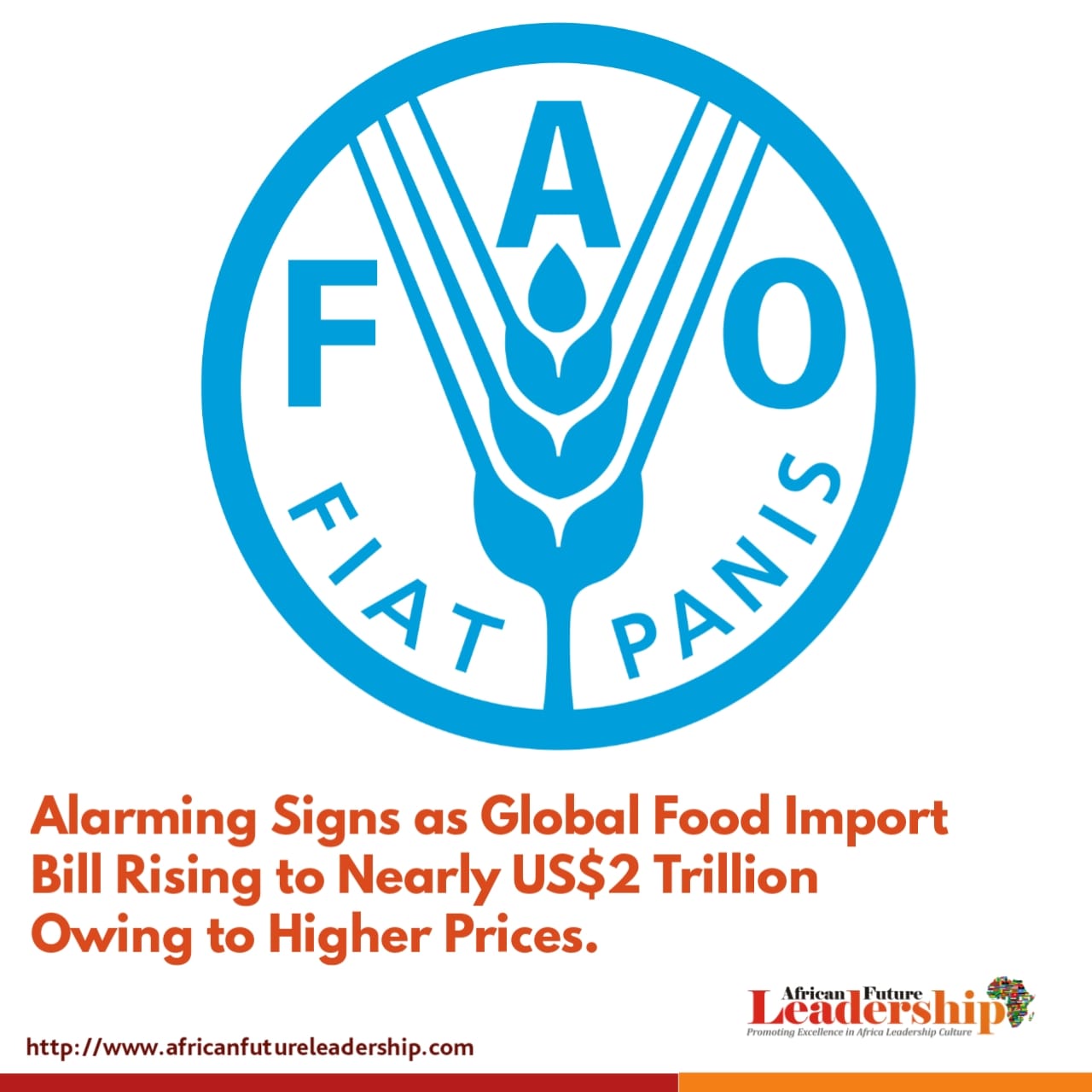Very significant information, issued recently, says the world food import bill is estimated to rise to US$1.94 trillion in 2022, higher than previously expected.
This development is according to a new report released today, 12th November, 2022, by the Food and Agriculture Organization of the United Nations (FAO).
Presently, the new forecast presented in FAO’s Food Outlook would mark an all-time high and a 10-percent increase over the record level of 2021, although the pace of the increase is expected to slow down in response to higher world food prices and depreciating currencies against the United States dollar. Both weigh on the purchasing power of importing countries and, subsequently, on the volumes of imported food.
Accordingly, the bulk of the increase in the bill is accounted for by high-income countries, due mostly to higher world prices, while volumes are also expected to rise.
It is said that economically vulnerable country groups are being more affected by the higher prices. For instance, the aggregate food import bill for the group of low-income countries is expected to remain almost unchanged even though it is predicted to shrink by 10 percent in volume terms, pointing to a growing accessibility issue for these countries.
A report from FAO’s Markets and Trade Division warns.“ These are alarming signs from a food security perspective, indicating importers are finding it difficult to finance rising international costs, potentially heralding an end of their resilience to higher international prices.”
READ MORE: Ghana is the most expensive West African country’ – Juliet Ibrahim
In this regard, the Food Outlook report, which breaks down food trade patterns by food groups, warns that existing differences are likely to become more pronounced, with high-income countries continuing to import across the entire spectrum of food products, while developing regions are increasingly focused on staple foods. And in this context, FAO welcomes the approval by the International Monetary Fund of a Food Shock Window – broadly based on FAO’s Food Import Financing Facility proposal – as an important step to ease the burden of soaring food import costs among lower income countries.
Furthermore, the Food Outlook also assesses global expenditures on imported agricultural inputs, including fertilizers. The global input import bill is expected to rise to US$ 424 billion in 2022, up 48 percent from the year before and as much as 112 percent from 2020.
Thus, higher costs for imported energy and fertilizer are behind the foreseen increase. Both are particularly relevant in import bills, posing strains for the current accounts of low-income and lower middle-income countries. As a result, some countries may be forced to reduce input applications, almost inevitably resulting in lower agricultural productivity and lower domestic food availability.
Hence, “Negative repercussions for global agricultural output and food security” are likely to extend into 2023, according to FAO.
World Food Outlook
The Food Outlook issued twice a year, offers reviews of market supply and utilization trends for the world’s major foodstuffs, including cereals, oil, crops, sugar, meat, dairy and fish. It also looks at trends in ocean freight rates. Supplies of most of these major commodities are at or close to record levels, but multiple factors point to tighter markets ahead.
For instance, world wheat production is forecast to reach a record 784 million tonnes in 2022/23, buoyed by significant harvest recoveries in Canada and the Russia Federation. That should push global wheat inventories to record levels, although the report notes that the accumulations are expected mostly in China and the Russian Federation, while stock levels are predicted to drop by 8 percent in the rest of the world.
Again, coarse grain inventories are forecast to fall to their lowest levels since 2013 due to inventory drawdowns in major countries as a result of anticipated declines in production. Global coarse grain production is forecast to fall by 2.8 percent in 2022, to 1 467 million tonnes. While it will likely drop in 2022/23, world rice output is envisaged to remain at an overall average level, buoyed by resilient planting levels in Asia and recovering output in Africa.
Also, global oilseed production is forecast to rebound and reach an all-time high in the 2022/23 marketing year, with increased outputs of soybean and rapeseed expected to offset a likely drop in sunflower seed production.
This is just as global sugar production is also forecast to increase, buoyed by expectations of a significant recovery in Brazil’s production and larger crops in China and Thailand, while consumption is seen growing at a slower pace.
And of course, worldwide outputs of meat and dairy products in 2022 are both expected to increase modestly, while total fisheries and aquaculture production is expected to increase globally by 1.2 percent, with a 2.6-percent expansion in aquaculture output anticipated to more than offset a slight fall in capture fisheries output.
Source: FAO




